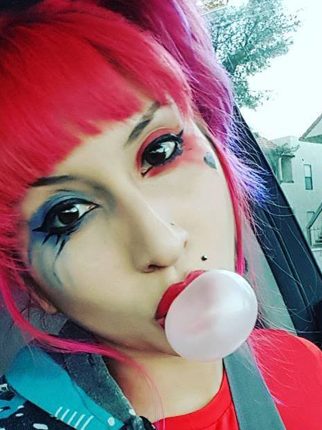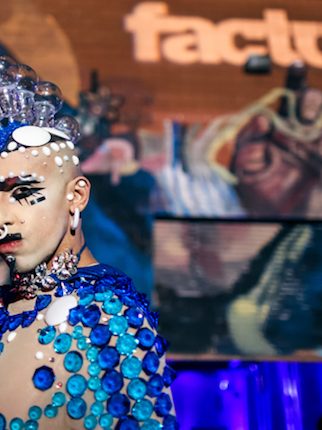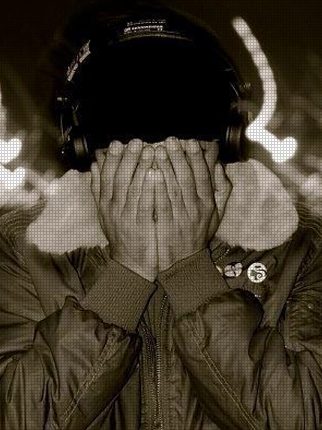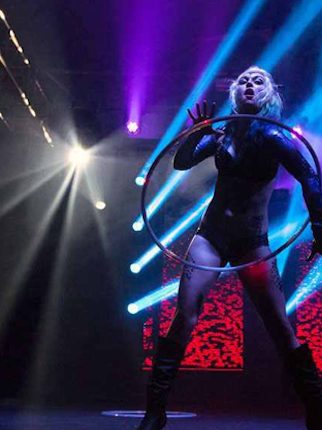My Life As: An Opening DJ
In this ongoing series, we investigate the realities and behind-the-scenes action of some of the wildest jobs in the dance music world.
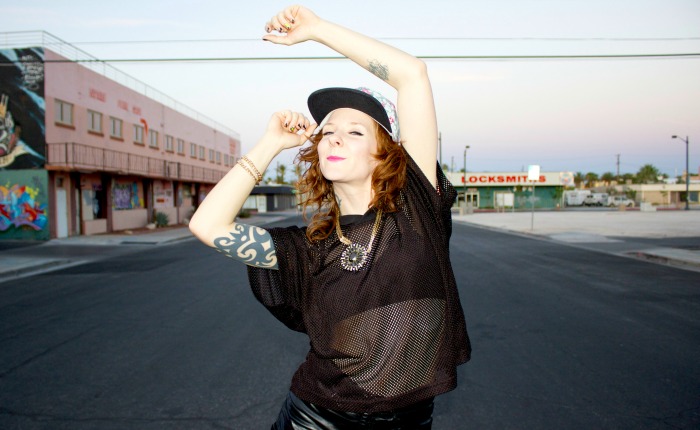
For every A-list DJ headlining a Las Vegas nightclub, there’s an opener tasked with the dirty work of getting the party started.
That’s where DJs like Crykit come in. Originally from a dairy farm in Kenosha, WI, Crykit cut her teeth in San Francisco’s rave scene, where she made a name for herself both behind the decks spinning drum & bass and on the dancefloor as a B-girl. After opening for acts like Diplo, she relocated to Las Vegas three years ago to make her foray into clubland. Her sound has since landed her gigs at nightclubs across town, opening for the likes of A-Trak, DJ Politik, Eric DLux and others.
Competing in Vegas isn’t easy, but for Crykit, that’s just part of the hustle. We spoke with her about life as an opener in the DJ mecca of Las Vegas.
“You can buy everything. You can buy your image. You can buy your sound. You can buy a producer. You pay someone to make your music and slap your name on it.”
What does being an opener mean in the DJ and club world?
I first got booked through a small boutique management agency. This club specifically said they wanted more girls to play for their lounges and to open in their hip-hop room, and that’s how I was brought into Vegas. That’s where I learned how to play an open-format Vegas club set. A typical set like that is expected to be up and down between hip-hop and house, trap, top 40, the classics. As an opener, you can never play anything that’s current. Their rule there was: Don’t play anything that was made within the last two years. It’s called burning the DJ. You don’t wanna burn the DJ. Anything that’s on the radio right now, you cannot touch as an opener. You want to warm people up to get them excited to hear all the current bangers.
If you’re opening for a producer or someone in the more underground electronic scene, it’s different because those guys mainly play the same set everywhere they go on tour. With those kinds of gigs, you have way more creative freedom to curate something more stylish. I really enjoy those gigs. I love that culture and playing for those rave and festival crowds. They tend to be there because they have a real connection to the music, whereas in the Vegas clubs it’s more about the overall experience: the hot bottle service girls, the confetti, the lighting, and mostly the alcohol.
What are the challenges of doing an opening set? What is it like if the room just hasn’t filled up yet, or people are still a little shy?
The challenge is the anticipation. The majority of people don’t understand the concept of an opener versus headliner DJ, in terms of what we can play. They’re waiting around, wondering where the new stuff is. Or if your booth is approachable enough, you’re getting nonstop requests. So I’m continually trying to explain to people that look, I’m just warming up, you’ve got to wait ‘til 12:30, 1am, whenever the headliner gets on. That’s never fun. Or if it’s a slow night, the pressure’s on you to keep the energy high or to keep people there drinking. Or if the dancefloor’s not that full, they’re probably buying drinks—which is what you want, but you also want to keep them dancing. So you have to juggle the two to make it look like there’s still a party. It’s all about how you play the game. You’ve got to strategize your flow.
How do you craft an opening set? Do you plan it in advance?
As an opener, most of us, we freestyle. We don’t have a planned set. I’ll have a crate or several folders of music that I’ll be playing, but I have to let the timing of the people and the venue and their vibe guide me. I watch to see what direction they’re headed in.
As DJs, especially some younger bedroom producers, have taken on these superstar statuses, what does that mean for someone who’s still trying to break in or open? Is it harder for traditional DJs to get slots?
Now, a lot of it is about the total package. It’s all in your marketing. They want you to flyer and bring all of your people. Technically, I could not really know anything about music but what’s on the radio; but if I make cool Vine videos or have a fashion blog or 500 likes on one photo, you can get hired off of those things alone—not your DJing specifically.
I feel like everything can just be bought. You can buy everything. You can buy your image. You can buy your sound. You can buy a producer. You pay someone to make your music and slap your name on it. It’s all about your marketing and branding. You’re not just a DJ; you’re an entire brand. For me, if I don’t keep up with all of those, I’m going to be left behind. Otherwise, I’m just a wedding DJ or playing bars, and it no longer is my career. These are all the things you really have to keep up on currently to stay relevant and get even further.
Does gender play a factor?
Oh, it definitely does—especially here in Vegas. Generally, I’ve always been into male-dominated things, so I don’t even really think of me being a female, but just me being me. I’m pretty androgynous, and that’s been my struggle here. I go for fun and funky over sexy. But it’s Vegas. People are coming for the Vegas experience that’s shown to everybody as the sexy cocktail waitresses with boobs out. There are not many girls in the DJing world, so they pick model-DJs that just have the look; they don’t know what they’re doing. They’ve gotten hired over me several times. I’ve been told to dress more sexy several times at gigs on the Strip. I don’t work for them anymore. It kills me, because I’m passionate about what I do; but at the same time, here it’s all about playing the game. That’s the image that they are looking for to complete the experience for their customers at the club. That’s what they’re doing, and that just wasn’t meant for me.
You hear about DJs in Vegas getting paid ridiculous amounts of money for a set. What about for an opener?
There’s no medium ground. You’re either a well-paid headliner, or you’re at the bottom. And it’s gotten even lower because of the accessibility of DJing. All these properties, their focus is on the headliner. Everybody else is hungry to get in there, and they’ll do it for the exposure or for a hundred bucks. But when you’re setting the tone for an entire room or club, I just feel there’s a lot more pressure and expectation than what is paid for. I don’t know how it could get any better unless there was some sort of like, DJ union that formed, because there’s always gonna be someone hungry who will do it for less or for free, just for the experience. I won’t say where, but in the main room at a mid-level club, I’ve gotten quotes for a 2.5-hour set for anywhere from $150 to $250. At one of the really big clubs, it would be at least $500 for a main room, maybe $400 for a side room if they have one.
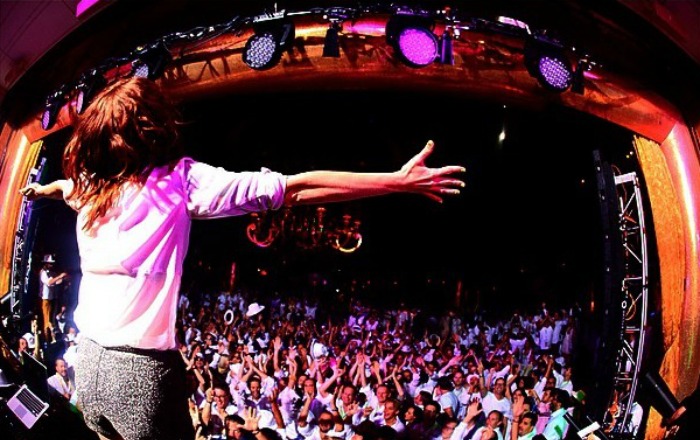
Does that pay the bills, or do you have to have a day job?
You can pay the bills, but nothing is solid. There are no contracts that say you’re going to be making a certain amount of money for a certain period of time. No one gives you the courtesy to let you know if a night is canceled. You can literally show up ready to play, and they’ll say, “Sorry, we’re not doing this anymore.” They don’t care. I’ve gone from having five steady nights a week to just one in the blink of an eye. It’s all about the hustle and the grind and keeping up until you get those big-time gigs and you get discovered.
But if you want to be a DJ, living in Vegas is the place to start. It’s like how L.A. is with film. I’ve been able to play a lounge while David Guetta or Hardwell are having dinner, and they can listen in. So you never know who’s out there and who can discover you. People have so much money here. Every little bar or restaurant, anything in Vegas wants DJs. We’re needed right now. I mean, I’m not balling, I didn’t buy a house. But here is the only place I’ve ever been able to pay the bills just by DJing, compared to living in San Francisco or L.A. It’s very affordable to live here, and that makes it easier. But it still took me the first two years here to really build before I could do it.
Even with those opportunities for exposure, how much room is there to grow to be a headliner? Is there a glass ceiling for local DJs, since the trend is to import big names from elsewhere?
It just takes a really long time—I’d say at least five years-plus of being with the same nightlife group or venue. One local DJ I was told to learn from has been working a group for over five years now, every week of every year, [and] was just able to get a headlining set in one of their main rooms. But it took her six or seven years to get there. Whereas a lot of these producers that are headlining haven’t even been producing for more than a couple years. It’s just however you get discovered and what happens from there. It’s doable; it’s just going to take a really long time and commitment. And it’s not just opening. A lot of times it’s waiting for the headliner to finish and then getting back on there and closing it out. You could be at the club for eight hours, getting paid minimally. But I tell myself every day: You can’t get frustrated with a glass ceiling in Vegas, because there’s gonna be one everywhere else in the world. When people hear you’re a DJ in Vegas, that perks their ears up. On your resume it looks glamorous; it’s exciting. To most other people, it means you’re doing something big.
What’s something that might surprise people about working in a Vegas nightclub?
Most DJs really hate requests. If you’re wondering whether you should go up there and request a song, don’t do it.
How does closing compare to opening? Are there rules for that as well?
It’s really hard to follow a headliner, with all the confetti and excitement, and then you have to get back up there and bring the vibe down.
The thing that really gets to me is when the club is closing, and it’s your last 15 minutes and you wind down the music, and people straight-up will boo, motion with hands to bring it back up. And all I can do is point at my hand like I’m wearing a watch, and they straight-up give me thumbs down and tell me I suck. I know they’re just drunk, but it happens all the time.
You hear a lot about big egos in the Vegas club world. Is that something you’ve encountered with either the venues or people you’ve opened for?
I won’t name names, but there are people out there who are arrogant and entitled. Superstardom has gotten to some people. The ones who are more unfriendly or non-appreciative tend to be in the typical Top 40 Vegas club. They have that vibe more so than a superstar producer from Europe. I don’t know if that’s just because some are coming from a club background where there’s alcohol and it’s wild and crazy, versus a rave or festival background where you have the whole PLUR thing. It could have to do with the kind of music and community they started in.
What’s next for you? Where are you hoping to end up?
Right now, my life is focused on Vegas club gigs and similar stuff, but I’m looking forward to getting back to festivals and raves, where I started. That community is where I came from. I’m working on curating my sound and seeking out those other kinds of opportunities and venues that I want.
Andrea Domanick is a journalist who lives in Las Vegas. Yes, people really live there. She’s on Twitter and Facebook.

